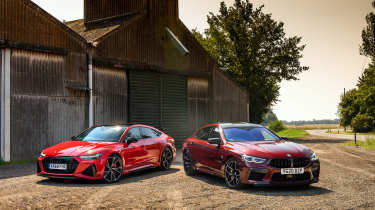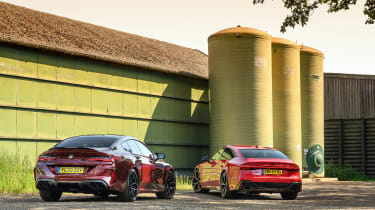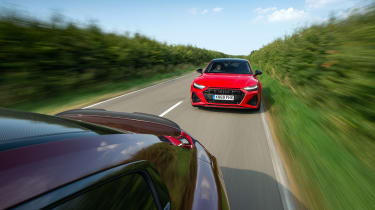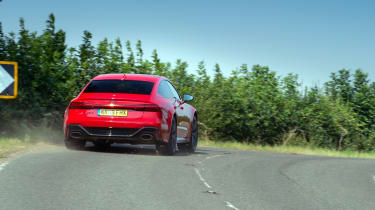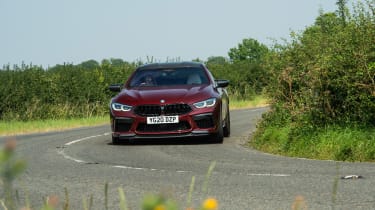BMW M8 Competition Gran Coupe vs Audi RS7 Sportback – battle of the alt-supersaloon
BMW's grandest of M8 Competition Gran Coupes takes on our impressive fast-fleet Audi RS7
Living in the shadow of the RS6 can’t be easy for the RS7. The former is the king-of-cool über family car, worshipped far and wide and an ever present in numerous three, five and even ten-car fantasy garage lists as the ‘daily’. With good reason, because few cars manage the duality of being a practical family car that can also cause its driver to raise a smile when they find themselves alone on a road more interesting than those often taken with the family on board.
In theory the RS7 should offer the same, albeit with no room for the hound in the boot. But in the past it has been a close relative to the RS6 in name only, feeling flat-footed, a little dull to drive and performing to the fast-Audi stereotypes of old. However, the new RS7 has proven to be a genuine RS6 alternative, and in the seven months ours has spent with us, only when the Towler clan (deputy editor Adam being the current custodian of the 7) has needed to go on holiday en masse has the increased capacity an estate car offers been missed.
Perhaps the biggest challenge for the RS7 isn’t from within, however, but from outside Audi Sport’s family, because if you want in the region of 600bhp in a four-door, slightly coupe-looking body you are somewhat spoilt for choice. Also in the VW Group is Porsche’s Panamera, while Mercedes-AMG has its GT 4‑Door and BMW has updated its entry with the car you see here: the M8 Gran Coupe, which is available to UK customers in Competition trim only.
More reviews
Group tests
- Ariel Atom 4R v Caterham Seven ‘evo25’: power-to-weight heroes go head-to-head
- Aston Martin Vantage V600 v Aston Martin Vantage GT8 – limited-run Astons go head-to-head
- Aston Martin Vantage vs Audi R8 V10 RWD – back to basics
- BMW E30 M3 v E46 M3 CSL v F87 M2 CS
- Caterham Super Seven 600 v Super Seven 2000
- Levante v T1
- Corvette Stingray v Porsche Cayman GTS v Audi R8 RWD
- Great Ferrari hypercars driven: 288 GTO, F40, F50 and Enzo head-to-head
- Hardcore Ferrari V8 specials go head-to-head
- Evolution of the Ferrari GT: 365 GTB4 Daytona to the 812 Superfast
In-depth reviews
- Abarth 600e 2024 review – Italian flair in an electric crossover?
- Alpine A110 review – distinctive, lightweight and unforgettable to drive
- Audi RS7 Sportback Performance review
- Bentley Continental R Mulliner: review, history and specs
- BMW 1-series review – Munich’s Audi A3 rival gains focus
- Cupra Leon 2025 review – the Golf GTI you want wears a Spanish frock
Long term tests
- Alfa Romeo Giulia Veloce Fast Fleet test – 7000 miles in the sharp Italian saloon
- Alpina B10: end of term report
- Alpina B10
- Alpina B10
- Alpina B10
- Ford Mustang GT
- Ford Mustang GT
- Ford Mustang GT
- Honda Civic Type R (FK8): living with it
- Land Rover Defender 110 Fast Fleet test – 9000 miles in the go-anywhere SUV
Review
- New Aston Martin DBS 770 Ultimate review – 759bhp super-GT driven
- New Bentley Batur 2023 review – can it possibly be worth £1.65m?
- 2023 Chevrolet Corvette C8 Z06 review – the American 911 GT3?
- Kia EV6 GT-Line S prototype review – the EV that shows how it’s done
- BBR Supercharged Mazda MX-5 (ND) 2023 review – tuned 250bhp roadster driven
- MG4 Trophy 2023 review
Reviews
- Abarth 695 75 Anniversario edition 2024 review – a fitting send-off for Abarth’s hot supermini?
- Abarth 500e 2023 review
- AC Cobra 378 Superblower MkIV 2021 review – another V8 Cobra, but with a GM heart this time
- Acura Integra Type S 2024 review – a Honda Civic Type R with added restraint
- Alfa Romeo Giulia Veloce 2023 review
- Alfa Romeo Giulia GTAm 2021 review – if Porsche built a four-door 911 GT3 RS
- Alfa Romeo SZ: history, review and specs of an icon
Technical make-up for both the M8 Competition Gran Coupe and RS7 Sportback is borderline off-the-shelf premium supersaloon. Twin-turbocharged V8? Check. Circa 600bhp? Yep, 592bhp for the RS7 and 616bhp for the M8. Five-hundred-plus lb ft of torque? Please, anything less would be an insult. Eight-speed automatic gearboxes? What else would you expect, other than possibly a double-clutch unit? Unfortunately, more mainstream manufacturers are now sticking to torque-converters, claiming the shift speeds are close enough to those of a double-clutch ’box and that the cost of developing both is a luxury rather than a necessity. BMW has also followed Audi’s 40-year tradition and now only offers its range-topping M-car with xDrive four-wheel drive. Although, unlike the Audi, you can, through diving into the submenus of the iDrive system, make your M8 Gran Coupe rear-wheel drive.
The initial thought when bringing the M8 to the RS7’s party was that the BMW would be sharper in those areas where the RS7 still reverts to brand type. There have been a number of times with our RS7 when whoever has been behind the wheel has enjoyed the unexpected interaction it provides. Its V8 has an enthusiastic character that’s matched with a crisp throttle and neatly suited ratios, providing a drivetrain that favours pushing from the rear rather than pulling from the front, ably assisted by the standard Sport Differential. But go beyond this 70 per cent operating window and the weight and size of the RS7 comes into play, the road never feeling big enough to exploit its performance and give it the space to move around. At around five metres long and two metres wide, an RS7 needs a fair bit of room when it gets moving.
BMW M GmbH knows how to make its performance cars feel special and dance around regardless of the speed you are travelling and the road you find yourself on. To a point, anyway. And indeed where the M8 outperforms the RS7 is when you go looking for, and need, that last 20-30 per cent of feedback and precision. As with our RS7 you need to find the right modes: Comfort dampers for both, Sport steering to add some weight, the sharpest throttle and shift speeds, and any differential settings available to you switched to their most alert and reactive mode. Configured accordingly the M8 GC is less prescriptive than the RS7 in all that it does. Its body control and damping is more in tune with your expectations, its steering quicker – less feelsome than the Audi’s, requiring a higher degree of load before you feel confident it’s hooked up, but when it is the M8 carves a more precise line. And its V8 is more energetic and reactive to inputs and therefore easier to maintain a balanced engine speed with when required.
However, the RS7 has the more immersive V8, both in terms of noise and how it builds through its powerband, and thumps along on its torque, a benefit of it being used across the VW Group from Bentley to Lamborghini, and by Porsche in-between, meaning Audi is able to tap into the available data and tune accordingly. In the M8 you merely gain speed, albeit at a frantic pace, whereas in the RS7 the octaves rise and fall in keeping with your pace, adding a fizz of excitement along the way.
BMW scores higher with its carbon-ceramic brakes (a £7995 option, compared to £9200 for the equivalent on the Audi), which are much easier to moderate and natural in pedal feel, making for far smoother and more consistent braking when you’re pushing on. And when there is 2000kg or more to slow you need the anchors to be on your side. (The M8 tips the scales at 1980kg, the Audi tips them even further at 2065kg.)
But for all its involvement and the thrills delivered by the M8 GC Comp, boy do you need to be travelling to experience them. In pure terms the BMW is a more focused, more athletic supersaloon than the Audi. It certainly answers the question more comprehensively than the RS7 does when it comes to asking which delivers the greatest performance when speed and space aren’t restricted. But here’s the crux. These are road cars, designed to offer a level of performance a cut above the norm, which they both most certainly do, but if you’re not exploiting all of the M8’s performance, its advantage over the RS7 is all but eradicated. If anything, at more level-headed speeds the RS7 gives more back more of the time.
An unexpected black mark for the RS7, however, is its interior. Much is made of the quality Audi manages to engineer into its cockpits, and our RS7 feels as solid today as it did before it started its non-stop life with us. But for all the shiny piano-black trim and the welcome use of Alcantara, there is too much £47,000 A7 TDI in here to justify the £95,000 starting price for an RS7 (our fast fleeter came in at £140,000…). The from-£123,880 M8 looks and feels far more bespoke, with the quality of its materials on a par with those of the machine produced in Ingolstadt. It also has the quieter interior to cover big miles in. Both cars swallow 300 miles (the best their fuel range will offer) in the blink of an eye, and only a ride quality that’s focused on performance, especially so in the case of the BMW, hampers these two from being leftfield alternatives to a more traditional GT car.
If our time with the RS7 Sportback has demonstrated anything it’s that the RS6 Avant no longer holds the driving advantage. The 7 might not be as iconic nor have the social media #want factor, but it can be considered on a par in terms of driver appeal if not dog-carrying ability. (Does anyone actually do this with their RS6, by the way, or is it just a term thrown around in a similar fashion to people talking about hosing out the interior of their Land Rover Defenders?)
The M8 Competition Gran Coupe is the better driver’s car than the RS7, but its biggest problem is the M5 Competition, which is £22,000 cheaper, and for that saving I’d be happy to forgo the former’s more bespoke interior design. I’d still have an RS6 over an RS7, too.

